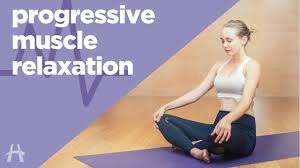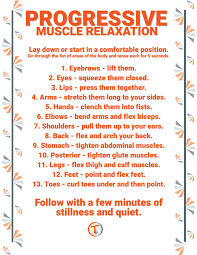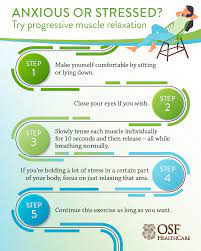The Benefits of Deep Muscle Relaxation
Deep muscle relaxation is a technique that involves consciously relaxing the muscles in your body to reduce tension and promote overall well-being. This practice not only helps in relieving physical stress but also has a positive impact on mental health.
Here are some key benefits of deep muscle relaxation:
Stress Reduction
By focusing on releasing tension from different muscle groups, deep muscle relaxation can significantly reduce stress levels. This process allows the body to enter a state of calmness, leading to a decrease in the production of stress hormones.
Improved Sleep Quality
Practicing deep muscle relaxation techniques before bedtime can help improve sleep quality. By relaxing the body and mind, you can create an optimal environment for falling asleep faster and experiencing deeper, more restful sleep throughout the night.
Pain Relief
Deep muscle relaxation can be beneficial for individuals experiencing chronic pain conditions such as back pain or tension headaches. By learning to release muscle tension through relaxation techniques, you may experience a reduction in pain intensity and frequency.
Enhanced Mental Clarity
When your muscles are relaxed, it allows your mind to focus more clearly and think more effectively. Deep muscle relaxation can help improve concentration, memory retention, and cognitive function by reducing distractions caused by physical discomfort.
Emotional Well-Being
Regular practice of deep muscle relaxation techniques can contribute to emotional well-being by promoting feelings of calmness and inner peace. By reducing physical tension, you may also experience a decrease in anxiety levels and an overall improvement in mood.
Incorporating deep muscle relaxation into your daily routine can have profound effects on both your physical and mental health. Whether you choose to practice guided meditation, progressive muscle relaxation, or other forms of deep muscle relaxation techniques, taking the time to relax your muscles can lead to significant improvements in your overall well-being.
5 Effective Strategies for Achieving Deep Muscle Relaxation
- Practice deep breathing exercises to help relax your muscles.
- Try progressive muscle relaxation techniques by tensing and then releasing each muscle group in your body.
- Engage in activities like yoga or tai chi that focus on stretching and relaxing the muscles.
- Use heat therapy, such as warm baths or heating pads, to help soothe tense muscles.
- Get regular massages to promote deep muscle relaxation and reduce tension.
Practice deep breathing exercises to help relax your muscles.
Practicing deep breathing exercises is a valuable tip for promoting deep muscle relaxation. Deep breathing techniques help increase oxygen flow to the muscles, facilitating their relaxation and reducing tension. By focusing on slow, deep breaths, you can engage the body’s natural relaxation response, calming both the mind and body. Incorporating deep breathing exercises into your routine can be a simple yet effective way to unwind, release stress, and promote overall muscle relaxation for improved well-being.
Try progressive muscle relaxation techniques by tensing and then releasing each muscle group in your body.
To experience the benefits of deep muscle relaxation, consider incorporating progressive muscle relaxation techniques into your routine. This involves tensing specific muscle groups in your body for a few seconds and then releasing the tension, allowing the muscles to relax fully. By systematically engaging and then releasing tension from different areas of your body, you can promote a sense of physical and mental relaxation, reduce overall stress levels, and improve your well-being. Practice this technique regularly to enhance your ability to unwind and achieve a state of deep relaxation.
Engage in activities like yoga or tai chi that focus on stretching and relaxing the muscles.
Engaging in activities like yoga or tai chi can be highly beneficial for deep muscle relaxation. These practices emphasize gentle stretching, controlled movements, and mindful breathing, which help release tension from the muscles and promote flexibility. Yoga and tai chi not only strengthen the body but also cultivate a sense of calmness and inner peace through their meditative aspects. By incorporating these activities into your routine, you can enhance your physical well-being while also experiencing the mental benefits of deep muscle relaxation.
Use heat therapy, such as warm baths or heating pads, to help soothe tense muscles.
Heat therapy, such as indulging in warm baths or applying heating pads, can be a highly effective method to soothe tense muscles during deep muscle relaxation. The application of heat helps to increase blood flow to the affected muscles, promoting relaxation and reducing stiffness. Whether you choose to immerse yourself in a comforting bath or gently place a heating pad on specific areas of tension, incorporating heat therapy into your relaxation routine can enhance the overall benefits of deep muscle relaxation and provide much-needed relief for your body.
Get regular massages to promote deep muscle relaxation and reduce tension.
Getting regular massages is a highly effective way to promote deep muscle relaxation and reduce tension in the body. Professional massages not only help release built-up muscle tightness and knots but also improve blood circulation, which aids in the removal of toxins and promotes overall muscle health. The skilled hands of a massage therapist can target specific areas of tension, providing relief and relaxation that can have long-lasting benefits for both physical and mental well-being. Incorporating regular massages into your self-care routine can be a valuable investment in your health and relaxation.



